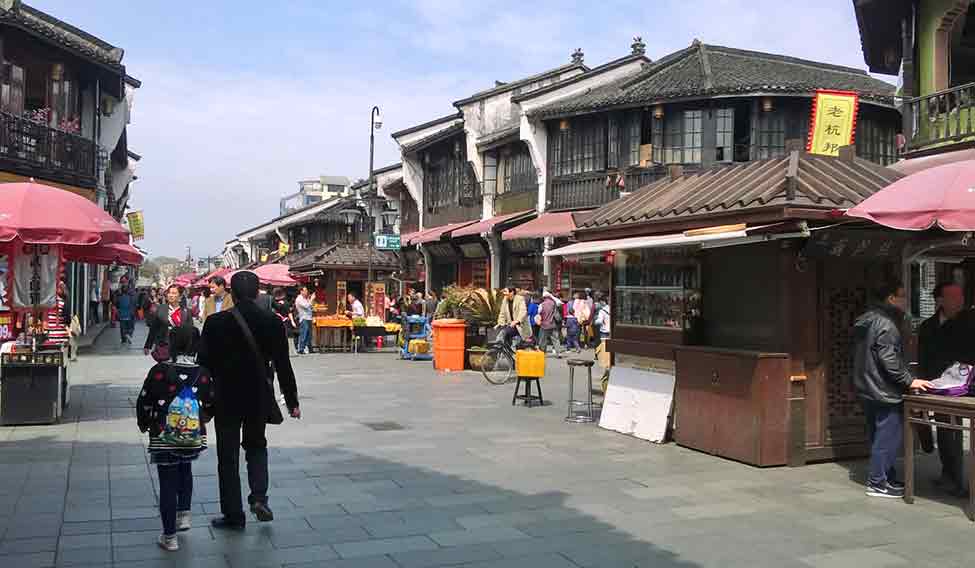It is a piece of history that Hangzhou, a city on the southeast coast of China, treasures. Dating back to the 12th century, the Qinghefang historic district of the city is a must visit in travellers' guides. White buildings with slanting roofs line the half-a-kilometre stretch of Qinghefang, and the place is abuzz with stalls selling a variety of merchandise, from green tea to the famed Hangzhou silk.
As tourists soak in the sights, sounds and smells, a group of college students are carrying out an assignment. Their task is to get visitors to fill in a brief questionnaire. There are questions such as “What do you like about China?” and “Suggest ways in which China can improve.”
One might think the survey is to find out how China can be made more popular for the tourists. However, there is a different plan behind the survey, and it is in keeping with the Chinese way of doing things. The survey is part of the city's preparations for hosting the G20 summit on September 4 and 5. The authorities, keen to get everything right, are finding out from tourists, in a rather tactful manner, what their issues with China are. They want to deal with those issues before the summit meeting of the heads of state of 20 leading economies of the world.
China assumed the presidency of the G20 last December and is hosting the summit for the first time. It is the first non-western country to host the summit. Hangzhou was chosen over Beijing and Shanghai possibly because it is the most economically vibrant city in China today.
One of the seven ancient capitals of China, Hangzhou represents the story of the great Chinese economic growth. Right where the Qinghefang historic district ends, there are gleaming malls housing the best global brands, and among them is perhaps Asia’s biggest Apple store. There are several banks, too, indicative of the enormous size to which the Chinese economy has grown.
In the World Bank's eyes, Hangzhou has China’s best environment for investment. It is known as one of the most innovative cities for entrepreneurs and as the capital of e-commerce in China. Alibaba, the Chinese e-commerce giant, is headquartered in Hangzhou. Besides, it has 4.7 lakh online business entities. The theme of the G20 summit is “Building an innovative, invigorated, interconnected and inclusive world economy.”
The city is known for its natural beauty. Marco Polo, the Italian traveller, described it as “the world’s most magnificent and noble city.” It has two world heritage sites, the West Lake and the Grand Canal. A biodiversity park, which is more like an artificial forest, acts as the city’s lungs. Within China, Hangzhou enjoys the reputation of being the “paradise on earth”.
The 2,200-year-old city is getting a makeover ahead of the G20 summit. Buildings are being repainted, roads are being redone, the public transport system is being strengthened, hotels are being built or refurbished and new ones are being built. There is a sense of pride involved in hosting the summit. As one denizen remarked, “It is like hosting the Olympics.” Banners saying “Good Host, Better G20” and “Warm Hospitality, Cultured and Polite,” can already be seen.
A volunteers corps comprising 750 students from the local Zhejiang University of Technology is being readied for the summit. The chosen ones are students of English from the university's College of Foreign Languages. “Becoming a volunteer is not only to serve leaders from the G20 countries, but also to show the spirit of the college and the students,” said Shelley, a third-year student. “We will be representing the Chinese people before the world.”
Hangzhou residents talk about the summit as an opportunity for the city. “The world will get to know us. It is also an opportunity for China to improve its economy,” said Chen Guoying, the 62-year-old president of Zhejiang Resource Development Group Co Ltd, a startup he founded.
Preparatory work for the summit is in full swing. State Councillor Yang Jiechi said China had set up a committee to coordinate preparatory work. The authorities were chalking out programmes of events and making arrangements for venues, facilities, logistics and security, he said.
The first meeting of the sherpas has already been held to draw up the priorities for the summit and China has proposed four key points—forging a new path for growth, more effective and efficient global economic and financial governance, robust international trade and investment, and inclusive and interconnected development. “These are consistent with the needs of the world economy and the direction of China’s development, and demonstrate the spirit of innovation,” said Yang.
China hosts the summit at a time when a slowing Chinese economy is affecting the revival prospects of a slothful global economy. The chaos in the stock market and the depreciation of the yuan were the major points of discussion at the meeting of the G20 finance ministers and central bank governors held in Shanghai earlier this year. Questions are also being raised about the relevance of the G20.
“Old problems remain unresolved while new challenges are emerging. Growth, trade, investment, geopolitics and other issues are intertwined,” said Chinese Foreign Minister Wang Yi at one of the preparatory meetings. He said the summit would endeavour to explore new ideas to boost the world economy and seek breakthroughs in growth, trade, investment and finance. “We will work with other G20 members for a new blueprint of innovative growth and address the root cause of sluggish growth through new elements and business models such as the new industrial revolution and digital economy,” said Wang. “We will vigorously advance cooperation in trade and investment to strengthen these two engines for growth.”








